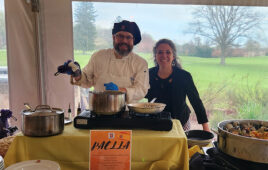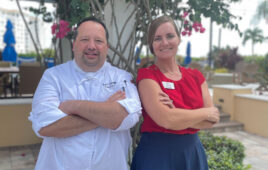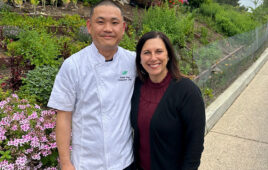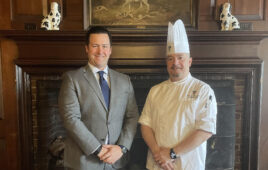 When Don Hunter, CCM, Chief Operating Officer for The Country Club of North Carolina (Pinehurst, N.C.), set out to hire a chef, he had a few key qualifications in mind. Adam Deviney, CEC, ticked all his boxes.
When Don Hunter, CCM, Chief Operating Officer for The Country Club of North Carolina (Pinehurst, N.C.), set out to hire a chef, he had a few key qualifications in mind. Adam Deviney, CEC, ticked all his boxes.
“While we have a significant number of members who live in the community, we also have members who live throughout the region, state and nation,” says Hunter. “It was important to find someone who could adapt to each group and develop the next group of club chefs.”
Deviney joined as Executive Chef about a year ago, and at the one-year mark, he signed a three-year contract.
“We’re in a very competitive environment in Pinehurst,” notes Hunter. “Going after the best local person is something my competitors would try to do. It’s what I would do if [Deviney] were competing with me. So locking him down, giving him some guarantees, and paying him fairly was important.”
Club + Resort Chef (C+RC): What sets chefs apart during the hiring process?
Don Hunter (DH): Every chef should have a strong web presence, no matter where they want to work. It’s the first thing a potential employer is going to look at. If you’ve been in the business a long time, you think your reputation opens doors for you. And there’s truth to that. But your reputation now is national; you’re marketing yourself to a much larger audience if you focus on your online presence.
Do they look like they have top skills, or are they average? Some dishes taste great, but they don’t photograph well. A chef should post things that photograph well. [Deviney] does a great job with that.
C+RC: What interview advice do you have for chefs?
DH: The interview process should be about deciding whether or not the person and the entity are a match. Chefs should represent their true selves.
For chefs new to the industry, working for a club that does $1M in food is a great place to start. They shouldn’t apply for a $3M, $6M or $8M operation because even if they make it through the interview process, they will most likely fail in that role.
It may not be the right position for that candidate at that club or at that very moment, but it’s important that the candidate leaves a good, honest impression. Similarly, the GM should not blow off candidates; they should get to know them, even if they cannot hire them at that time.
C+RC: What else should chefs ask during an interview?
DH: It’s important to ask about competition, travel and education.
It’s also important that the chef asks if the club at some point would be open to a long-term contract. Once a chef proves themselves, they should have some guarantees because our industry changes leadership regularly.
C+RC: How do you suggest chefs approach the topic of salary?
DH: It’s important to go in with a competent plan. Every private club with a 501(c) tax status has their sales dollar volume available online. There is a direct tie to sales and what a club can afford. There’s nothing wrong with going to a club and saying, ‘I see your sales are $1.2M. I think I can get them up by $400,000. If I do that, my expectation is X.’ That said, it’s not the first thing that should be discussed in an interview process.
As general managers, we want to hear about a chef’s passion for the industry and their plan for our club. If we like the sound of that, we’re happy to talk about money, but not until we know we’ve found the right candidate.
C+RC: What recruiting strategies does your club use?
DH: Relationships are extremely important. Adam Deviney came from a friend: Carmen [Mauceri, General Manager/COO of The Club at Mediterra in Naples, Fla.]. He felt [Deviney] was ready to run his own program.
[Deviney] found our new Executive Pastry Chef Savanna [Brodar] during a competition, and by following her on LinkedIn and Instagram, he could understand her level.The time to look for a chef is not when your chef just left; it’s years in advance. You have to network and build relationships constantly.
C+RC: Once you reach the final interview stages, have you found balancing a chef’s asks with the board’s budget difficult?
DH: I’m pretty lucky I’ve been with clubs that have trusted me with the process. … For the general manager, when you get to that final part of the hiring process, it’s important to make sure the chef knows what the club is all about. … Every club is different. They all have challenges. You need to be honest about the challenges.
C+RC: What makes for a good GM-chef relationship? How do you and Deviney get along or communicate?
DH: I think we’ve been successful because I understand my role, and he understands his role. My role is to make sure that the members understand what he is trying to achieve in the program; I make sure that that is communicated well and often. We do that through the many ways we communicate with our members online, in newsletters and emails to make sure we’re constantly marketing where we’re headed so it’s not a surprise when they come into dinner and find out we’ve elevated to the next level of food. I must understand how to do that.
I also support them with equipment and thought processes on the steps to afford to be at that level. Right now, we have three full-time equivalents that did not exist before [Deviney] who are highly qualified culinarians. We must be in a good financial position to do that in advance. That’s my job. His job is then to make sure that he doesn’t waste those opportunities. He does a great job.
C+RC: What other ways has he impacted the food and beverage program so far?
DH: He’s brought a level of quality and a level of professionalism to the kitchen. He’s been able to maintain our employees and add great ones.
He has a very good center-of-the-plate aesthetic. He knows how things should look at the top level. We’ve gone from a food and beverage program comparable to our competitors to a new class. I don’t feel like we have competition because of the part of the marketplace we’ve chosen to be.
C+RC: What’s next for your club?
DH: It’ll be the first time in three years that we have a full-blown, highly trained executive pastry chef, so we’re excited about that. [Savanna Brodar] just started, and she’s already killing it.
Our next move will be to put a new hood system in our kitchen. It’ll be the final part of our kitchen renovation. … Managers need to understand that they need to find a way to fund a quality work environment. Getting the members, the decision-makers in the kitchen is important—take them back there when it’s busy, when they can see the chaos.
We’re going to shut down in January for about three weeks. Then almost everything in our kitchen will have been new in the last three years.




